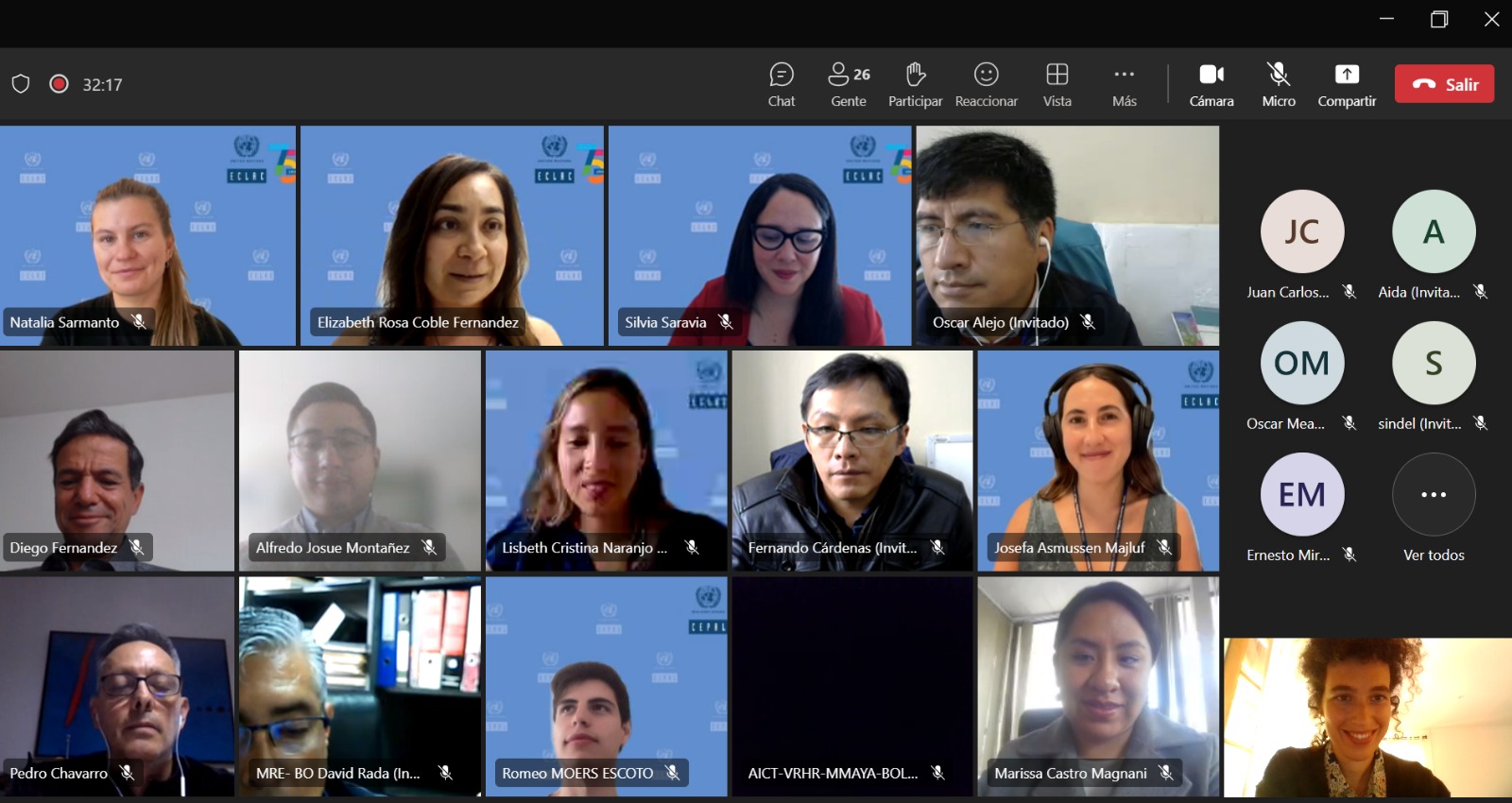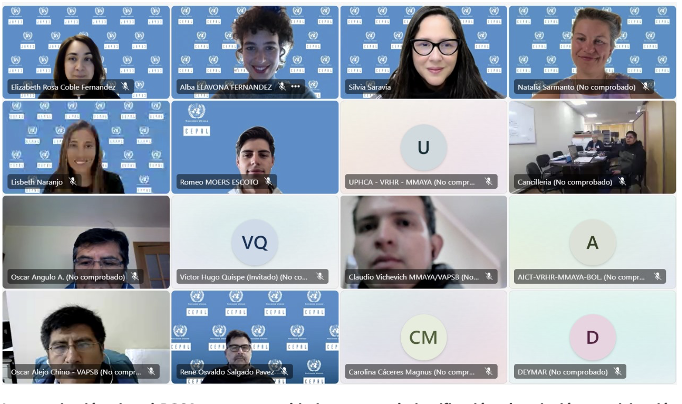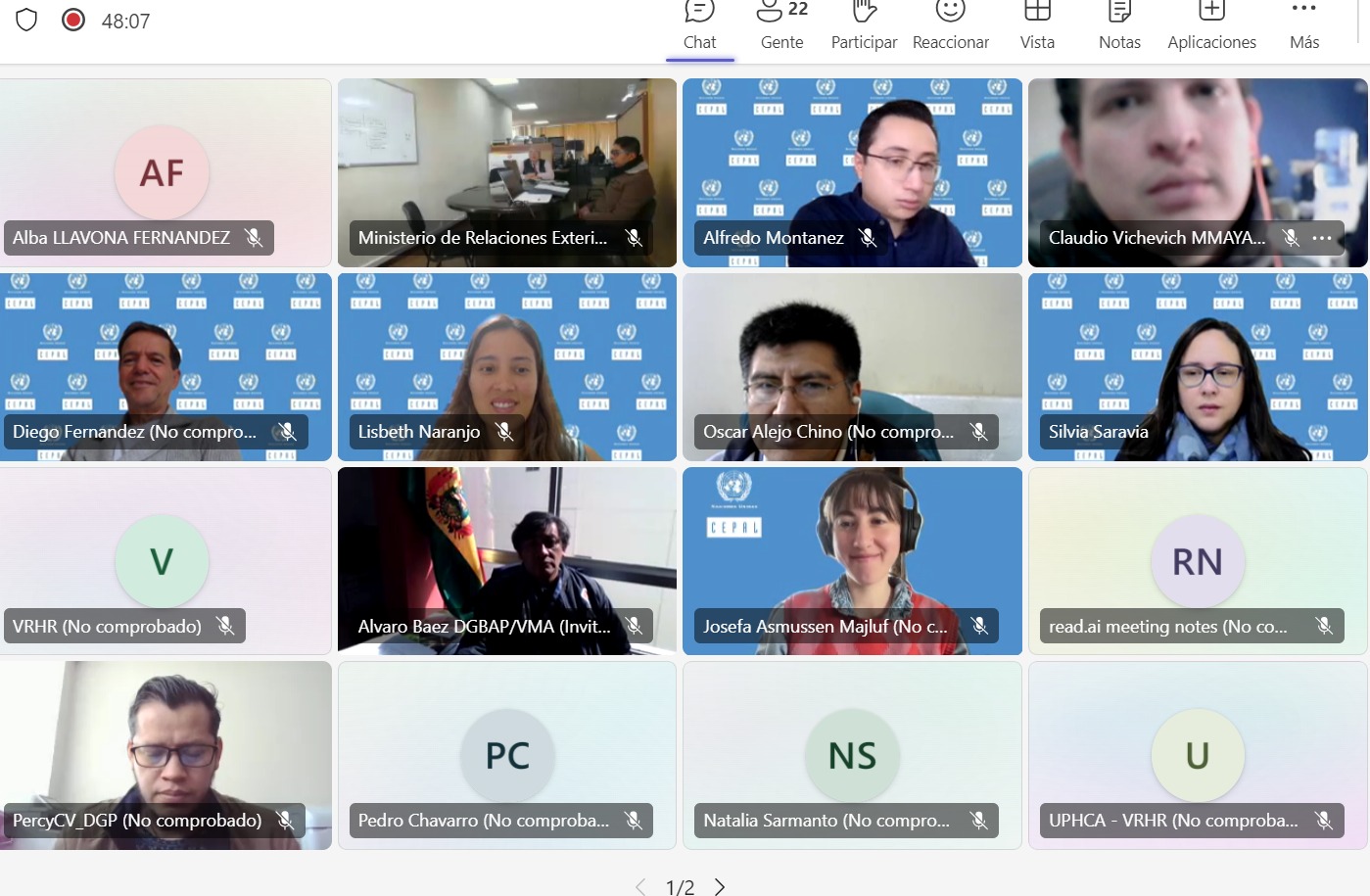ECLAC and the Ministry of Foreign Affairs of Bolivia organized the high-level discussion “Water at the Center of Sustainable Development” as part of the Bicentennial of the Plurinational State of Bolivia
Work area(s)
Topic(s)
With the participation of national authorities, international organizations, and regional experts, the high-level discussion “Water at the Center of Sustainable Development” was held in La Paz as part of the Bicentennial of the Plurinational State of Bolivia. The event was organized by the Government of the Plurinational State of Bolivia and the Economic Commission for Latin America and the Caribbean (ECLAC).

La Paz, May 6, 2025 – In the Tiwanaku Hall of the Ministry of Foreign Affairs of Bolivia, the high-level discussion “Water at the Center of Sustainable Development” took place within the framework of the Bicentennial of the Plurinational State of Bolivia. The activity was promoted under the project Regional Network and Observatory for Water Sustainability (ROSA).
The event brought together a wide institutional representation from the country, including the Ministry of Environment and Water, Ministry of Development Planning, Ministry of Hydrocarbons and Energy, Ministry of Rural Development and Lands, Ministry of Defense, Ministry of Health, EPSAS, EMAGUA, and the Autonomous Governments of La Paz and El Alto. This call reflected a national commitment to the construction of integrated and sustainable public policies around the water resource. Likewise, the event included the participation of United Nations System agencies in Bolivia and regional experts in water resource management.
The opening of the event was led by national authorities, including Ms. Celinda Sosa Lunda, Minister of Foreign Affairs, who highlighted the importance of creating a space for dialogue, exchange, and reflection on the strategic value of water for the present and future of the country. She also emphasized the water and sanitation coverage gaps that need to be addressed, especially in rural areas. She commented on the issues of water quality degradation and the lack of data, which limits the understanding of the problem and the capacity to take action to solve it. Minister Sosa also recalled the struggle of the Bolivian people during the Water War in 2000, which led to the constitutional recognition of this natural resource as a fundamental right. She also stressed the current challenges in the face of the climate crisis and the urgency of advancing in the implementation of SDG 6. Furthermore, Minister Sosa highlighted the need to strengthen water planning with a climate approach, social inclusion, and respect for the rights of Indigenous originary-peasant peoples.
Ms. Anna Marttinen Pont, Resident Coordinator of the United Nations System in Bolivia, also noted that water is much more than a natural resource. It is a fundamental human right, an essential element for life, and a driver of sustainable development. She stated that while Latin America and the Caribbean (LAC) face some challenges in ensuring water security—including the context of the climate crisis and the region’s three major development traps: low capacity for growth, high inequality, and weak institutional capacities—there is no room for pessimism. On the contrary, this situation should encourage us to redouble efforts and accelerate the fulfillment of SDG 6. She considers that key responses revolve around governance, institutions, and financing.
Subsequently, Ms. Silvia Saravia Matus, Economic Affairs Officer at ECLAC, delivered a keynote address titled “Water at the Center of Sustainable Development.” In her presentation, Ms. Saravia Matus provided several figures on the region’s water reality to highlight not only the impacts of climate change but also the investment and execution gaps in public water budgets and the structural challenges in water management. She indicated that this situation directly affects the sustainable development of countries. Saravia also detailed some of the main international processes that provide an action framework to address current water challenges, including the declaration of the human right to water and sanitation, the 2030 Agenda and SDG 6, the International Decade for Action “Water for Sustainable Development” (2018–2028), the SDG 6 Global Acceleration Framework, the Water Conference, the LAC Regional Water Dialogues, and the UN-Water Water and Sanitation Strategy. She concluded her presentation with a call to action to guarantee the human right to safe water and sanitation; to value water in all its dimensions—social, cultural, environmental, and economic; to invest in resilient infrastructure and climate change adaptation; to strengthen inter-institutional coordination, IWRM, and transboundary cooperation; and to promote the circular water economy.
“The Bicentennial of the Plurinational State of Bolivia is an opportunity to build together a more resilient, just, and sustainable water future,” she stated.
Following this, Mr. Daniel Rodríguez, Director General of Watersheds and Water Resources at the Ministry of Environment and Water, gave a presentation to set out the national vision of water resources. He provided details on the regulatory and institutional framework and on the Plurinational Water Resources Plan (PWRP) 2021–2025, which establishes the political vision “Water for All, Water for Life”, of a multilevel and multisectoral nature, aimed at ensuring the sustainability of Bolivia’s water resources. It also guides the development of sectoral policies based on integrated management of surface and groundwater resources to achieve balanced development between water supply and demand. Furthermore, he pointed out some of the national water challenges and opportunities for progress in water resources management. These include investment in capture and storage technologies such as dams and rainwater harvesting systems to ensure supply; water use efficiency through agricultural practices such as drip irrigation and promoting responsible use to reduce demand; integrated water resource management through plans that consider availability, quality, and demand, with participation from multiple stakeholders; the creation of a Water Authority for more effective management and the strengthening of governance by improving local participation and transparency in decision-making. Additionally, the promotion of water reuse in agriculture and industry to reduce demand for fresh water and climate change adaptation strategies to address scarcity and respond to droughts are considered. They are also developing a new water resources sector policy for 2026–2030, using past experiences to improve future strategies.
To conclude, a roundtable was held with the participation of representatives from various vice ministries of the Plurinational State of Bolivia, along with ECLAC, moderated by Ms. Marissa Castro, Director General of Boundaries and International Transboundary Waters. Among the main agreements reached was the need to strengthen inter-institutional water planning with a climate focus, improve intersectoral coordination to address the water-energy-food-ecosystems nexus, and promote the development of robust indicators for monitoring and evaluating public water management.
In this way, the high-level discussion reaffirmed the commitment of the Plurinational State of Bolivia to sustainable and integrated water management, recognizing its strategic value for social well-being, food security, the energy transition, and the protection of ecosystems, all guided by the principles of Living Well (Vivir Bien) and respect for Mother Earth.
Related content

First Online Technical Assistance under the ROSA Project – Plurinational State of Bolivia
As part of the Water Sustainability Network and Observatory (ROSA) project, the first online technical assistance for the Plurinational State of Bolivia was held on February 15, 2024. This inaugural…

ECLAC organizes the second virtual training session as part of the ROSA project's technical assistance to the Plurinational State of Bolivia: "International Processes Around Water Resources."
The virtual ROSA training aimed to review the justification, description, participation, and outcomes of the various international processes related to water management, including aspects relevant to…

Third Virtual Training Session under the ROSA Project for the Plurinational State of Bolivia: “Application of Circular Economy Principles in the Drinking Water and Sanitation Sector”
On Friday, September 6, 2024, the third online training session on the “Application of Circular Economy Principles in the Drinking Water and Sanitation Sector” was held, directed at the Plurinational…